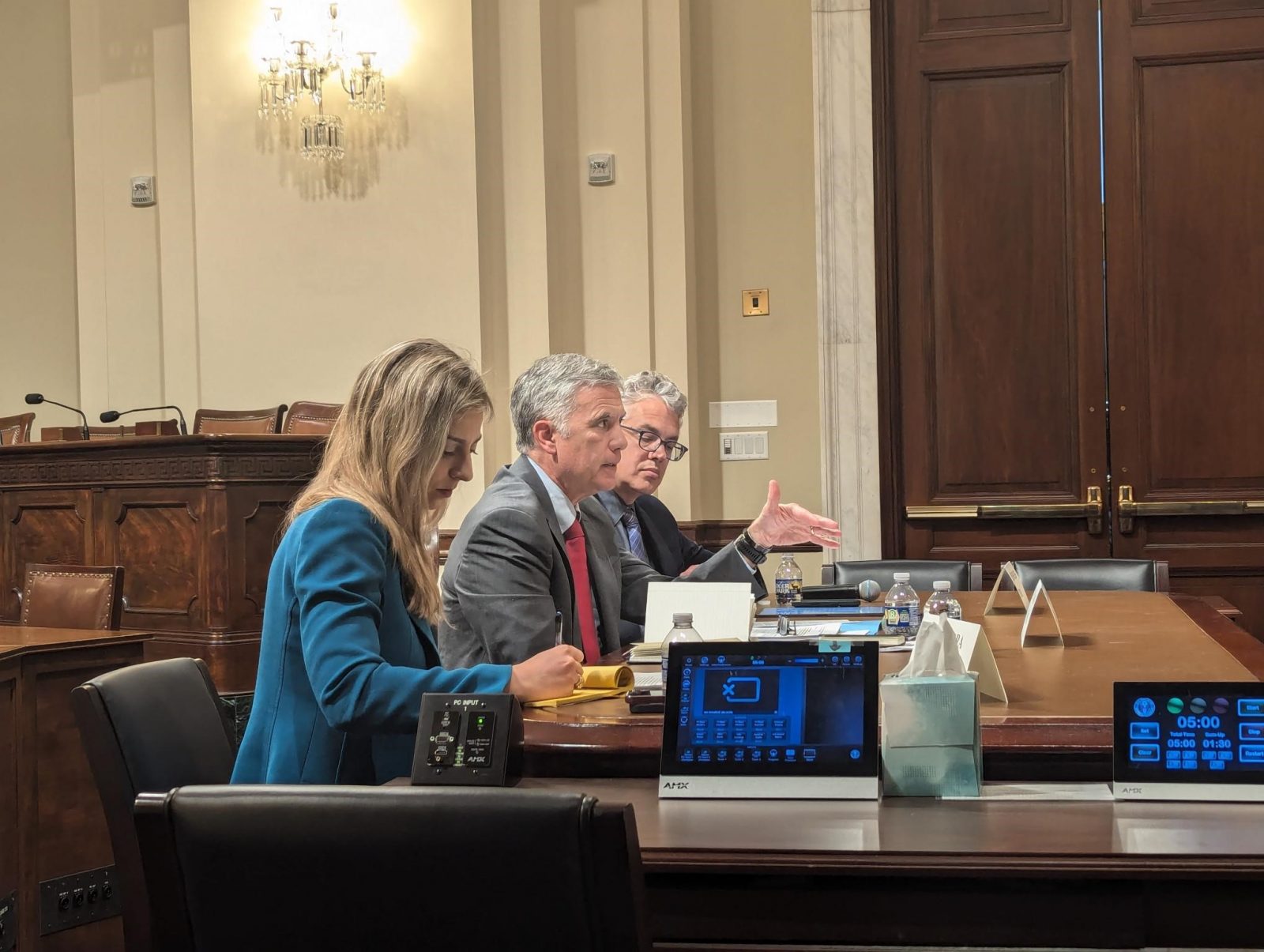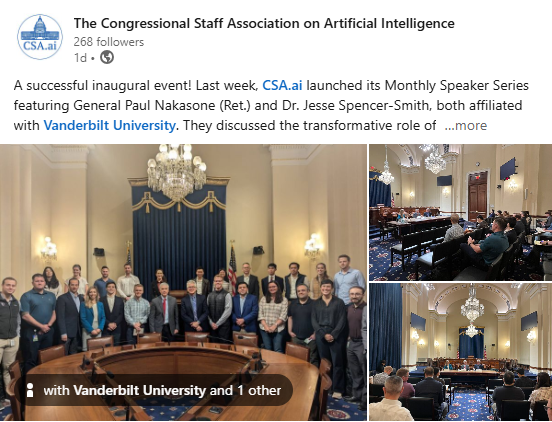As artificial intelligence transforms industries and reshapes national security, it presents both extraordinary opportunities and significant challenges. To address the complexities AI poses to the nation’s economy and security, Vanderbilt University experts retired Gen. Paul Nakasone, founding director of Vanderbilt’s Institute of National Security, and Jesse Spencer-Smith, interim director of the Data Science Institute, shared crucial insights with a bipartisan group of congressional staff on Capitol Hill.

Nakasone, a former commander of U.S. Cyber Command and director of the National Security Agency, and Spencer-Smith, a leading AI researcher, were invited by the Congressional Staff Association on Artificial Intelligence, a bicameral, nonpartisan organization, to speak at their inaugural Monthly Speaker Series to demystify AI concepts and technologies.
CSA.ai aims to enable congressional staff to shape AI policies and understand its implications for industries, security and regulation by engaging with key stakeholders like Vanderbilt experts. The group is sponsored by bipartisan members, including Rep. Mark Green, R-Tenn., who represents Vanderbilt, Rep. Ted Lieu, D-Calif., Rep. Zach Nunn, R-Iowa, and Rep. Don Beyer, D-Va.
AI’s impact on security and industry
At the event, Spencer-Smith provided an overview of AI’s technical foundations, explaining how AI has evolved from basic machine learning to today’s generative AI, which can perform complex tasks and approach human-level reasoning capabilities. He pointed to the evolution of ChatGPT, which struggled with the SAT in 2019 but can now score among the top 500 students.
Nakasone discussed the opportunities AI presents for logistics, autonomous technologies and national security, including how AI could help prevent future cyberattacks.
“As former commander, U.S. Cyber Command, and director of the NSA, it shouldn’t be a surprise that my thoughts immediately go to how AI can enhance military capabilities,” Nakasone said. “AI is the most important and disruptive technology of our time. In the autonomous space, it has the potential to support our efforts to bring multisource intelligence together into something actionable.”
However, they pointed out that with these opportunities come significant challenges. Spencer-Smith emphasized the massive computational demands of modern AI systems to function this way. For example, training ChatGPT 3.5 required around 50 gigawatt hours over 100 days—enough electricity to power 30 million homes in a single day. He also raised the privacy concerns surrounding AI’s reliance on vast amounts of personal data, stressing the importance of safeguarding individuals’ privacy.
The case for a federal AI strategy
Nakasone argued for the need for a federal strategy on AI to address ethical considerations, workforce displacement and global competition. He also pointed out the challenges posed by the patchwork of state-level regulations and called for a rich dialogue between sectors to address issues such as data privacy and investment in the AI workforce.
Nakasone talked about the important role the National Defense Education Act played during the Cold War and the need to renew that effort with a focus on digital education to address today’s challenges.
“In 1957, after the Soviet Union launched Sputnik, Congress responded swiftly with the funding that underpinned the nation’s efforts to respond and win the Cold War; what does this need to look like to bring the next generation of leaders? We need leaders who can speak in both code and policy to solve our challenges.”
He specifically mentioned Vanderbilt’s thinking around how to prepare graduate and undergraduate students for the jobs of the future given the reality of AI and called on the audience to think seriously about the challenges in front of us.
Engaging with congressional staff
The congressional staff were eager to engage with Nakasone and Spencer-Smith on topics ranging from data privacy to U.S. leadership in AI. Nakasone and Spencer-Smith addressed questions on AI sovereignty, workforce adaptation, and the role of semiconductors in the global AI race, stressing the need for a strategic approach to maintain competitiveness. Many of the questions the staff asked involved areas of active research and debate that Vanderbilt experts specialize in.
Vanderbilt’s Office of Federal Relations facilitated Nakasone and Spencer-Smith’s participation in this event, enhancing Vanderbilt’s influence on policy by connecting congressional staff with the university’s experts and thought leaders.
“As AI continues to reshape the national and global landscape, Vanderbilt University remains committed to leading the conversation on responsible innovation and policy development, ensuring that advancements in technology benefit society while safeguarding privacy and security,” said Heather Bloemhard, director of federal relations for Vanderbilt University.
Following the event, CSA.ai shared photos and highlights on social media, recognizing the key contributions of Vanderbilt experts.
